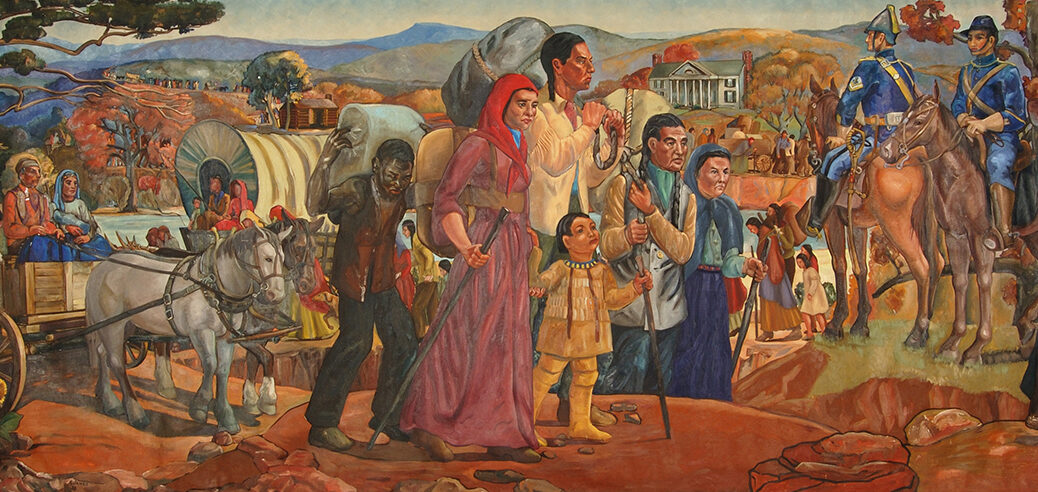The origins of the “Five Civilized Tribes” label for the Cherokees, Choctaws, Chickasaws, Creeks and Seminoles has long puzzled me. I am pretty certain that I used the phrase in the Master’s thesis I wrote in the late 1980s at Cal State Long Beach. I know that some of the historians I cited in that work did so, too. Grant Foreman published Indian Removal: The Emigration of the Five Civilized Tribes of Indians in 1953, and R. S. Cotterill The Southern Indians: The Story of the Civilized Tribes Before Removal a year later, both with the University of Oklahoma Press. But what are the origins of the phrase? Who used the phrase first? When, and why, did they do so?
I always had assumed that it originated with the opponents of Andrew Jackson’s policy of “Indian Removal” in the 1820s and 1830s. Foreman and Cotterill used the phrase in this context. Supporters of the Cherokees, and the Cherokees themselves, boldly proclaimed the progress their Nation had made on the march towards “civilization,” and used this as a strong argument for remaining upon their lands in the American southeast. The Nation’s newspaper, the Cherokee Phoenix, contained stories and statistics on the number of spinning wheels and oxen, and acres under cultivation, on the Nation’s lands. No wandering savages, the Cherokees were native southerners, as “civilized” as the planter elite, and ought to be allowed to stay where they long had been. That the phrase might fit for this period seemed to make sense.
Turns out I was wrong about that. I looked through the books on my shelves. The phrase seems to have come along well after the Cherokee removal had taken place. I searched the Library of Congress American Memory collection. The Continental Congress received a petition from the Brothertown Indians referring to the “partly civilized tribes from the east end of Long Island,” but that’s different. Members of the legislative and executive branches spoke frequently of the importance of “civilization” and “civilizing” the Indians, but not with specific reference to the Cherokees and their southeastern neighbors. I looked through Google Books as well, but nothing there preceded the era of the Civil War and Reconstruction. The Indian Office records housed at the National Archives, now digitized, show that the phrase did not come into use until after the Civil War as well. The earliest newspaper article containing the phrase, according to a search of Newspapers.com, did not appear until 1871. A Kansas newspaper reported on a visit to the “five civilized tribes” in the Indian Territory, and fear that the region could be further inflamed by an Indian war. The second article using the phrase appeared in 1873, in Kansas, in a discussion of the “question” of Indian citizenship. It mentioned “what are called the five civilized tribes,” so named because “for the last generation they have not depended upon the chase for subsistence, but have cultivated the ground.” The way the phrase was used in these two articles make it clear that it was around earlier, but I have not determined how early.
It does seem, however, that “Five Civilized Tribes” came into common usage during the Concentration and allotment era, as a way to contrast the “civilized” Nations relocated to the Indian Territory with their “savage” or “wild” neighbors who had to be compelled to move to reservations. C. E. Boudinot, featured in that 1873 article, told General Sherman and others in Washington that the Board of Indian Civilization’s “concentration” policy of placing “wild Indians in the territory of the civilized Indians would be “disastrous to the civilized minority” of Indigenous peoples in the region. Americans referred to the Cherokees’ “civilization” frequently. It factored in discussions of the allotment of their land, for instance. The “civilization” of these Indigenous peoples, government policy makers asserted, made them fit candidates for allotment. They already were civilized. They knew how to work their lands. They no longer needed the antiquated nonsense that was, in Americans’ view, Indian tribal governments. Cherokees seem to have used the phrase to suggest that, indeed, they were civilized, that they had survived the trauma of removal, and they had settled in and were fine as they were. Because they were so like their white neighbors, they did not need their lands broken up and divided, and Americans could rest assured that they would not join with the hostile Plains Nations, so unlike them in so many ways. Their civilization could, in different hands, be used to argue for their dispossession or the integrity of their relocated community.
This obviously is a cursory look at a complicated question. But it sends home the message that it is always worth while to think about the words and phrases they use, where they come from, and why they are deployed by those who make use of them.


